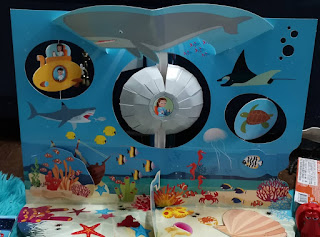How I Plan and Develop a Unit Study
A Unit Study is different from a regular lesson. Let's take for example the topic ocean. A regular lesson would involve a discussion of the ocean, the living organisms in it and maybe some other smaller topics about it.
For Sunset of the Sabertooth or Prehistoric Unit Study, I brought out this Evolution of Man set. We also did some puzzles and played with prehistoric animal figures.
With a Unit Study, you discuss all of the mentioned plus more. You can do Math, STEAM, language, reading activities, etc. with a Unit Study.
A Unit Study also involves more preparation and discussion than a regular lesson. You can also base a Unit Study on a specific series of chapter books.
For easier understanding, let's take our latest Unit Study as an example. For the next few weeks, we will be discussing the ocean. I base our current Unit Studies on the chapter book series, The Magic Tree House. Before, when my son didn't have any interest in chapter books yet, I just asked him what topics interest him and developed activities around that topic.
Here's what happens on a typical Unit Study
We read a couple of chapters of The Magic Treehouse (MTH). He reads it aloud and I follow along to make sure that he is reading correctly. I also take this time to correct pronunciation and intonation. I sometimes interject with questions to learn if he understands some of the words or expressions.
Then we choose one reference book to explore and discuss. Usually, we choose the one that has the topic (or the closest one) to what happened in the story.
We then continue this until we finish the MTH book.
In between studies, we do some brain breaks or other activities such as games, arts and crafts, math, writing, and anything else I could think of.
Here are some examples of our past unit studies.
For Egypt Unit Studies, we learned about how to make a mummy.
Here are some of the books that we studied for Afternoon on the Amazon or Amazon Unit Study. We also had fun with puzzles and animal figures.
For the Dinosaur Unit Study, I made this sensory bin filled with homemade playdough, river stones and dinosaur figures.
Here's what we did/read for Night of the Ninja, aka Japan Unit Study.
My Quick Tips for Developing a Unit Study
- Decide what topics you want to discuss. Geography - by country unit studies. Science - by topic like space, prehistoric animals, the human body, etc. By book series like The Magic Treehouse or Jack Stalwart, etc. I usually decide on this at the start of a homeschool year so that it will be easier to prepare for them.
- IMPORTANT - collect or buy the books and materials that you will need for each unit study. I always keep my eyes peeled for materials. They can be lying around in your home or you can buy them from bookstores, online or borrow from the library. I usually check what the next three or so books we will be discussing so that when I'm out and about or are organizing things, I can get/buy them and put them in one basket which leads me to...
- Organize your unit studies. I usually have a basket or a container to corral all the materials that we will use for our unit study. This way, you can just pull the basket whenever it's time to study. Then put everything back after. Cleaning up after a unit study will be much, much faster and easier. Then fill up the basket again when it's time for a new unit study.
- Be creative with activities. And, I also always include some playtime with mom or independent play.
- Write your plan. It's important to have a lesson plan of some sort even if it's just an outline of books to read and activities to do. You can plan it by day or week. If you're homeschooling and adding unit studies to your daily schedule, writing your plans is definitely something you should do.
If you want more Unit Study Posts, check out my archives. I have several posts about past Unit Studies.
If you have questions, feel free to comment below and I'd be happy to answer them!









Comments
Post a Comment